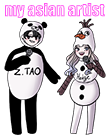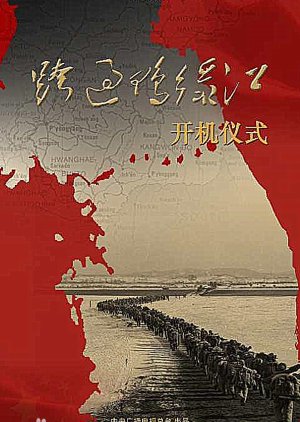Lu Chengfeng found that there was a sniper in the opponent's position, and immediately told his comrades beside him not to show up. Oliver's helmet was blown off, and he finally met the only goal of the trip. The battle casualties of the Fifty Army are too heavy. The key is that the food and ammunition have been exhausted. The US military has also discovered this situation and is focusing its firepower on their offensive. The South Korean army on the eastern front has exposed its stance. President Peng ordered an attack on the eastern front. The 50th Army left only one regiment, and the rest of the troops withdrew to the north bank of the Han River. The 38th Army must hold the position firmly on top. Xie Fang was worried that the 38th Army had suffered more than half of its casualties and it was already difficult to hold on. Peng knew that the 38th Army and the 50th Army also knew that they had no reserve team at all, and they had to hold on to the last person.
The troops on the western front have withstood more than ten days, and now the troops on the eastern front urgently need to fight quickly and rush to help. Deng Hua ordered Hengcheng to be encircled and annihilated first, and then Pingpingli. Now the battle on the Western Front is as tragic as the battle on the Xiangjiang River. The casualties are so high that the troops on the Eastern Front are also very worried. They must resolutely force the U.S. troops on the western front to return to aid and relieve the pressure on the western troops. The eastern front fought bravely, defeating the South Korean army and forcing the United Nations to retreat 26 kilometers. When a division was knocked out in two days, the opening of the Eastern Front was completely torn apart. At the moment, as long as Topyeong-ri is captured and the east-west front is connected, the US military can be forced to retreat. President Peng ordered Deng Hua to launch an attack tonight.
Li Qiwei could not believe that the Chinese generals could believe that a small number of soldiers could hold their positions in front of a hundred times stronger enemy. At present, the US generals in Topei-ri sent a telegram requesting retreat, but Li Qiwei ordered him to hold the position and not allow the volunteers on the east-west line to connect. However, his subordinates thought that this was a bet on the lives of six thousand US troops. Li Qiwei bluntly said that the volunteers were also taking risks. He strictly ordered the troops to flee and rectify the law on the spot, and he wanted Dipingli to become Stalingrad on the Korean battlefield.
Deng Hua pondered President Peng's arrangement and asked them to take advantage of the enemy's movement to annihilate them while retreating. Deng Hua mobilized the six regiments of the 49th Army and ordered that Toupingli must be taken overnight. The soldiers marched hard against the heavy machine guns and tanks of the U.S. Army, but the disparity between the weapons and equipment of the enemy and us was really difficult. The soldiers failed to take the position that night. On the second day, US reinforcements arrived. Although the US infantry units were eliminated, tanks and reinforcements from South Korea had arrived in Topyeong-ri, and the volunteers could only resort to repeated attacks in the face of aircraft bombing. Faced with a sudden change in US military tactics, President Peng finally ordered a retreat in order to reduce the casualties of the soldiers, but in this fourth battle the volunteers still successfully completed the task of defensive positions.
The supplies that had just been sent were completely wiped out after such a battle. The Korean battlefield still needs to strengthen its forces and shorten the supply line. As the weather starts to warm up, supplies will be more convenient, and the trained army will soon cross the river. General Peng learned from the combat experience of the Fifty Army. The strength of the troops should be light in front and heavy in the back, and firepower should be heavy in the front and light in the back. Xie Fang suggested dividing the troops into two echelons to alternately organize defenses. President Peng has delineated the final bottom line for the retreat of the volunteers and handed over the command of the war to them. He wants to return to Beijing to report on the battle. Before leaving, he proposed to go to the Han River to inspect the front line.
MacArthur also came to Li Qiwei's command post. He demanded that Seoul be quickly recovered. Li Qiwei formulated the so-called butcher plan to report to MacArthur. The basic principle is to rely on firepower to suppress the enemy and advance the front, without giving the Chinese army a chance to reorganize and counterattack. MacArthur held a press conference and invited Li Qiwei to join him. He proudly introduced the butcher plan and promised to take advantage of this plan to recover Seoul. He will hold his next meeting in Seoul. Li Qiwei sat on the bench silently and looked at MacArthur, but MacArthur didn't even pay attention to what he just said to himself, and then disbanded the meeting directly. Li Qiwei looked at the empty seat and tightened his gloves.
When Zeng Zesheng came to the battlefield, there was only one regiment of a division on the battlefield. Even the guard company and the cooking soldiers were on the front line. He vowed that he would coexist and die with the soldiers. President Peng went to the front line of the Fifty Army. He asked Zeng Zesheng about the number of casualties. Zeng Zesheng told him that the number reported every day was all alive and capable soldiers. President Peng painfully questioned why he never asked him, Zeng Zesheng still firmly said that the Fifth Army will stick to it until the retreat order is issued. The 50th Army was adapted from an uprising army, and after this battle they were finally able to excel in the brothers' army. President Peng is strong enough to bear the tears. They have never looked at the Fifty Army differently. After this battle, he will definitely give the Fifty Army a large number of replacements. All weapons and equipment will be given priority to supply them. Zeng Ze is lively. There is a fight to serve the country.
Zhou Enlai talked to Mao Zedong about domestic construction this year. In such a situation, Mao Zedong could only instruct one side to fight, to build national defense, and to restore the economy. The commander of the 19th Army, Yang Dezhi, waited for President Peng’s return, but President Peng, who had not had a good rest for more than a month, fell asleep in the car, but as soon as he heard the key of the car stalling, President Peng came to his senses. He quickly got down. The car came to shake hands with Yang Dezhi. The US imperial weapons and equipment are really advanced. President Peng reminded them that the Korean campaign will not be easy when they are about to enter the DPRK. The 19th Army under Zhu De's army had been instructed in every possible way before the expedition. They will definitely be bold and careful in fighting. Mr. Peng touched Yang Dezhi's cotton-padded clothes sewn with new cotton. It was this clothes that caused the Nine Corps to suffer a big loss, and this was one of his purposes for opposing Beijing.
Zheng Rui and Lu Chengfeng sneaked into the US military barracks. A patrolling soldier discovered the clue. Lu Chengfeng deceived the opponent in standard English, and Zheng Rui slipped behind him and successfully killed the enemy. Afterwards, the volunteers all climbed over the iron fence and sneaked into the US camp.

